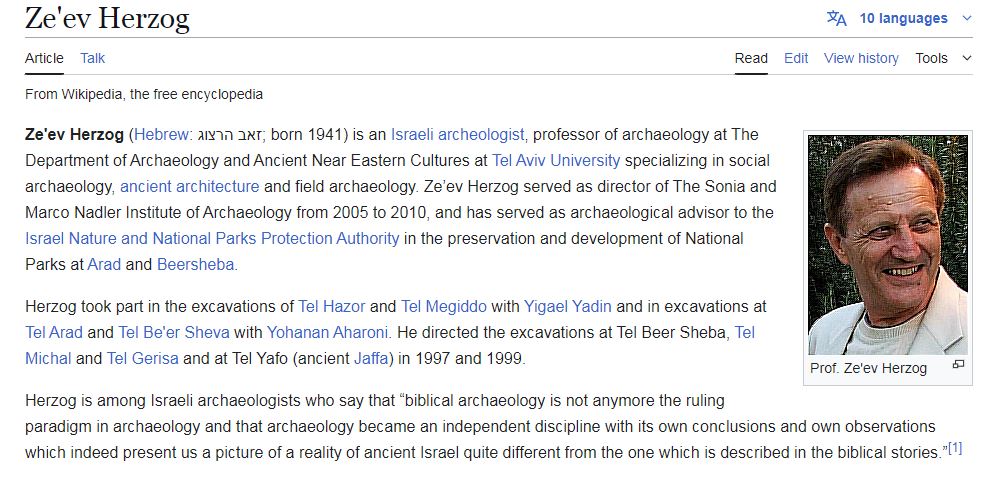moon
Satire for Sanity
They weren't there at all
BIBLICAL ARCHAEOLOGY FOUND NO TRACE OF THE ISRAELITES IN PALESTINE:
Zionist historiography asserts that archeology in Israel “has provided a valuable link between the country’s past and present, with thousands of years of
history unearthed at some 3,500 sites” (Israel Ministry of Foreign Affairs 2003c). Yet these unearthed sites did not show evidence for the Biblical
Israelites in Palestine. This was the conclusion repeated by leading American, British, Arab, and Israeli researchers in Biblical archaeology and history.
Biblical archaeology was initially led by John Hopkins University Professor of Semitic Languages William Foxwell Albright who came to Palestine in
1919.
British archaeologist Michael Rice (who worked for decades in the Arab world) concludes that the efforts of Israeli archaeologists and their European
and American colleagues “have produced nothing of proven archaeological value” that demonstrates that the Israelites were ever in Palestine (Rice
1994, 114). In addition to the lack of archaeological evidence for David or Solomon (in the ardently excavated levels of Jerusalem) or for Moses, the
captivity in Egypt, or the Exodus, one also finds that the great Biblical events left no trace in the annals of the Egyptians and the Babylonians (Rice 1994,
114-116). University of Stirling Professor of Religious Studies Kith Whitlam presents Biblical studies within the colonial context as “a discourse of power”
and “a rhetoric of representation” passed down without examination and designed to dispossess the Palestinians of their land and their past (Whitlam
1997, 235). For instance, the excavation of at least 23 levels of occupation in Jericho (the first walled city) shows “no sign of Abraham, Isaac and Jacob,
the slavery in Egypt, or anyone wandering in the desert” and no proof that Jericho’s fabled walls “came tumbling down” after Joshua captured the city
(Adams 1999).
American University of Beirut Professor of History Kamal Salibi comes to similar conclusions: “First, traces of the origins of the Hebrews in
Mesopotamia, and their assumed migration from there to Palestine by way of North Syria, have been diligently sought for over a century but never
actually found. Second, no incontrovertible traces of an Israelite captivity in Egypt, or of an Israelite exodus from there at any period of antiquity, have
yet been discovered” (Salibi 1985, 24). Salibi added that the place-names mentioned in the so-called “Amarna Letters” were West Arabian place-names
and that the Egyptian and Mesopotamian expeditions and invasions of Sheshonk I, Necho II, Sargon II, and Nebuchadnezzar were directed against West
Arabia, not against Palestine and Syria (Salibi 1985, 24).
These critical findings about ancient history are deepening the crisis of identity in Israel. Haim Weitzman cited one example of the agonizing questions
that he thinks haunt the Zionized Jews’ collective and individual identity: “If ABRAHAM, Isaac, Jacob, Moses, and David aren’t proven, how am I
supposed to live with that?” He noted that this question came from the crowded back row of an auditorium at Ben-Gurion University during a conference
titled “Has the Biblical Period Disappeared?” (Weitzman 2000, A19-A20). Tel Aviv University Professor of Archaeology Ze’ev Herzog’s research on the
Canaanite cities in the Late Bronze Age shed more light on how Zionist ideology influences the interpretation of archaeology because the latter “served
as a tool in building a national identity of modern Israelis.” He argued that “a thorough examination of the archaeological findings free of preconception
displays that the city of the Late Bronze Age is essentially different from the Canaanite city as it was presented, and is still presented, by historians,
Biblical scholars and archaeologists” (Herzog 2003).
He summed up the major archaeological findings of 70 years of intensive excavations in Palestine: “The patriarchs’ acts are legendary, the Israelites did
not sojourn in Egypt or make an exodus, they did not conquer the land. Neither is there any mention of the empire of David and Solomon, nor of the
source of belief in the God of Israel. These facts have been known for years, but Israel is a stubborn people and nobody wants to hear about it” (Herzog
1999). Commenting on Herzog’s findings, Tel Aviv University Professor of Archaeology Israel Finkelstein noted that “today more than 90% of scholars
agree that there was no Exodus from Egypt” (Finkelstein 2004).
INDIANA STATE UNIVERSITY .
FREE PALESTINE.
BIBLICAL ARCHAEOLOGY FOUND NO TRACE OF THE ISRAELITES IN PALESTINE:
Zionist historiography asserts that archeology in Israel “has provided a valuable link between the country’s past and present, with thousands of years of
history unearthed at some 3,500 sites” (Israel Ministry of Foreign Affairs 2003c). Yet these unearthed sites did not show evidence for the Biblical
Israelites in Palestine. This was the conclusion repeated by leading American, British, Arab, and Israeli researchers in Biblical archaeology and history.
Biblical archaeology was initially led by John Hopkins University Professor of Semitic Languages William Foxwell Albright who came to Palestine in
1919.
British archaeologist Michael Rice (who worked for decades in the Arab world) concludes that the efforts of Israeli archaeologists and their European
and American colleagues “have produced nothing of proven archaeological value” that demonstrates that the Israelites were ever in Palestine (Rice
1994, 114). In addition to the lack of archaeological evidence for David or Solomon (in the ardently excavated levels of Jerusalem) or for Moses, the
captivity in Egypt, or the Exodus, one also finds that the great Biblical events left no trace in the annals of the Egyptians and the Babylonians (Rice 1994,
114-116). University of Stirling Professor of Religious Studies Kith Whitlam presents Biblical studies within the colonial context as “a discourse of power”
and “a rhetoric of representation” passed down without examination and designed to dispossess the Palestinians of their land and their past (Whitlam
1997, 235). For instance, the excavation of at least 23 levels of occupation in Jericho (the first walled city) shows “no sign of Abraham, Isaac and Jacob,
the slavery in Egypt, or anyone wandering in the desert” and no proof that Jericho’s fabled walls “came tumbling down” after Joshua captured the city
(Adams 1999).
American University of Beirut Professor of History Kamal Salibi comes to similar conclusions: “First, traces of the origins of the Hebrews in
Mesopotamia, and their assumed migration from there to Palestine by way of North Syria, have been diligently sought for over a century but never
actually found. Second, no incontrovertible traces of an Israelite captivity in Egypt, or of an Israelite exodus from there at any period of antiquity, have
yet been discovered” (Salibi 1985, 24). Salibi added that the place-names mentioned in the so-called “Amarna Letters” were West Arabian place-names
and that the Egyptian and Mesopotamian expeditions and invasions of Sheshonk I, Necho II, Sargon II, and Nebuchadnezzar were directed against West
Arabia, not against Palestine and Syria (Salibi 1985, 24).
These critical findings about ancient history are deepening the crisis of identity in Israel. Haim Weitzman cited one example of the agonizing questions
that he thinks haunt the Zionized Jews’ collective and individual identity: “If ABRAHAM, Isaac, Jacob, Moses, and David aren’t proven, how am I
supposed to live with that?” He noted that this question came from the crowded back row of an auditorium at Ben-Gurion University during a conference
titled “Has the Biblical Period Disappeared?” (Weitzman 2000, A19-A20). Tel Aviv University Professor of Archaeology Ze’ev Herzog’s research on the
Canaanite cities in the Late Bronze Age shed more light on how Zionist ideology influences the interpretation of archaeology because the latter “served
as a tool in building a national identity of modern Israelis.” He argued that “a thorough examination of the archaeological findings free of preconception
displays that the city of the Late Bronze Age is essentially different from the Canaanite city as it was presented, and is still presented, by historians,
Biblical scholars and archaeologists” (Herzog 2003).
He summed up the major archaeological findings of 70 years of intensive excavations in Palestine: “The patriarchs’ acts are legendary, the Israelites did
not sojourn in Egypt or make an exodus, they did not conquer the land. Neither is there any mention of the empire of David and Solomon, nor of the
source of belief in the God of Israel. These facts have been known for years, but Israel is a stubborn people and nobody wants to hear about it” (Herzog
1999). Commenting on Herzog’s findings, Tel Aviv University Professor of Archaeology Israel Finkelstein noted that “today more than 90% of scholars
agree that there was no Exodus from Egypt” (Finkelstein 2004).
INDIANA STATE UNIVERSITY .
FREE PALESTINE.




